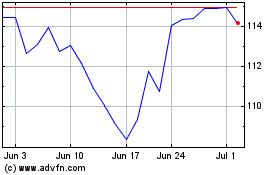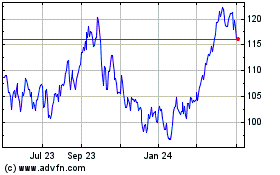France's Total to pay $4.95 billion in shares, as Danish group
focuses on shipping
By Sarah Kent and Costas Paris
This article is being republished as part of our daily
reproduction of WSJ.com articles that also appeared in the U.S.
print edition of The Wall Street Journal (August 22, 2017).
Total SA has agreed to acquire Danish conglomerate A.P.
Moeller-Maersk A/S's oil unit for $4.95 billion, signaling a
renewed appetite for deals in the global oil-and-gas industry.
The deal will help the French energy giant bolster its position
among the world's largest oil companies, potentially boosting its
earnings and cash flow and shoring up its ability to pay
dividends.
By 2019, Total now says its production will reach 3 million
barrels a day of oil and gas -- a level achieved by only a handful
of private companies including Exxon Mobil Corp. and Royal Dutch
Shell PLC. Total currently produces around 2.5 million barrels a
day.
For Maersk, among the world's largest shipping companies, the
deal streamlines its business as it grapples with historic
downturns in both the shipping and oil industries.
It is the first sale for Maersk after it announced plans to
break up the company last September. It is also looking to sell or
list by the end of next year other units, such as Maersk Drilling,
which operates oil and gas rigs mainly in the North Sea, and Maersk
Tankers, which moves oil and oil products on a fleet of 158
vessels, and Maersk Supply, a fleet of 44 support ships for
offshore operations.
Maersk is trying to reshape itself into a global supply-chain
player like United Parcel Service Inc. and FedEx Corp. The plan
involves moving more ships through its port operations, APM
Terminals, and more cargo inland through Damco, its
supply-management division handling airfreight, trucks and
warehouses.
"We are investing in our core business" of shipping, Maersk
Group Chief Executive Soren Skou said. The sale to Total "will
strengthen the financial flexibility of AP Moller-Maersk and free
up resources to focus our future growth on container shipping,
ports and logistics," he said.
The acquisition, announced by both companies on Monday, is the
latest sign of consolidation in the oil-and-gas industry, which
finally appears to be stabilizing after a prolonged downturn in
petroleum prices.
Total and other big oil companies say they have reduced their
costs enough to generate cash at crude prices at current levels,
about $50 a barrel, giving them flexibility to grow through
acquisitions.
In the U.S., where small shale-oil producers have proved
remarkably resilient amid low energy prices, the sector has
experienced a flurry of deals. So far this year, deals in North
America have totaled $73.2 billion, more than in all of 2016,
according to data from Edinburgh-based consultancy Wood
Mackenzie.
Activity has also picked up internationally, particularly in
Europe. Though the number of European deals so far this year stands
at roughly half the level of those completed in 2016, their value
has reached $16.8 billion, compared with $5.3 billion in all of
2016, according to Wood Mackenzie.
Many of the acquirers have been private-equity firms and smaller
players, eager to get a foothold in major oil areas such as the
North Sea.
Earlier this year, Shell sold its British North Sea assets to
Chrysaor Holdings Ltd. in a deal valued at as much as $3.8 billion.
Chrysaor is backed by Harbour Energy Ltd., an investment vehicle
managed by Washington-based EIG Global Energy Partners.
Total's acquisition of Maersk Oil is one of the biggest deals in
the sector since Shell's roughly $50 billion acquisition of BG
Group last year.
Total will pay for the deal with $4.95 billion in shares, while
also taking on $2.5 billion in Maersk oil debt. The French company
will also assume nearly $3 billion in expected costs for
decommissioning oil rigs in the North Sea.
In Monday trading, Total's shares rose 0.3% while Maersk closed
up 2.9%.
"We imagine [Total] investors won't be overly enthused with the
idea of buying more oil barrels when they are overly concerned with
falling oil demand," Bernstein said Monday in a note that praised
the deal for adding potentially profitable barrels.
The deal is a vote of confidence in the North Sea, where around
80% of Maersk's reserves are located. The region has been a major
oil-and-gas hub for decades but has also been plagued by high
costs, aging infrastructure and declining production.
Total will be northwest Europe's second-largest offshore
operator once the deal closes, expected in next year's first
quarter. The deal has been approved by both companies' boards but
remains subject to shareholder votes and regulatory approvals.
--Dominic Chopping contributed to this article.
Write to Sarah Kent at sarah.kent@wsj.com and Costas Paris at
costas.paris@wsj.com
(END) Dow Jones Newswires
August 22, 2017 02:47 ET (06:47 GMT)
Copyright (c) 2017 Dow Jones & Company, Inc.
Exxon Mobil (NYSE:XOM)
Historical Stock Chart
From Mar 2024 to Apr 2024

Exxon Mobil (NYSE:XOM)
Historical Stock Chart
From Apr 2023 to Apr 2024
